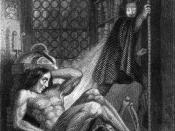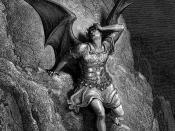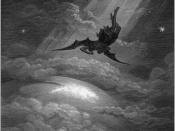Gregory Conley
Mrs. Smith
27 May 2004
English Literature
Frankenstein's Paradise
"Paradise has been lost." Frank Henenlotter's 1990 film, a campy retooling of Mary Shelley's Frankenstein by the name of Frankenhooker (Wolf 344), tells the tale of a mad scientist who, in order to bring his wife back to life, decapitates, dismembers, and reassembles 42nd street hookers into the form of what he believes to be perfect woman ("Frankenhooker"). When his reanimated creature turns out to be much too contumacious to handle, he rapidly begins to lose his formerly steadfast grip on life. Unable to exculpate himself, he utters the aforementioned phrase. Those who have not had the opportunity to indulge themselves in the source material for Frankenstein most likely let the speaking of those four words pass without a second thought to what Henenlotter is paying an homage to. It is, however, very obvious to the knowledgeable few just how much meaning the quote holds.
In the 1660s, a well-known poet by the name of John Milton came to the decision of how his name would hold merit for years to come. Milton wanted to do for the English epic what Homer, Virgil, and Dante had done for Greek, Latin, and Italian versions, respectively ("Paradise Lost"). With that in mind, John Milton wrote "Paradise Lost," basing it off of the Genesis account of creation and fall (Burris). When it comes to Shelley's Frankenstein, Milton's pre-Romanticism poetic work (Lynch) that used ''things unattempted yet in Prose or Rhyme" (Milton I. 16) holds much merit when deciphering the true knowledge within Shelley's timeless classic. For it is the intricate, but at the same time very parallel, characters in both works that make the lessons that they teach all that more significant.
The idea of a "noble savage" has been popular in...


